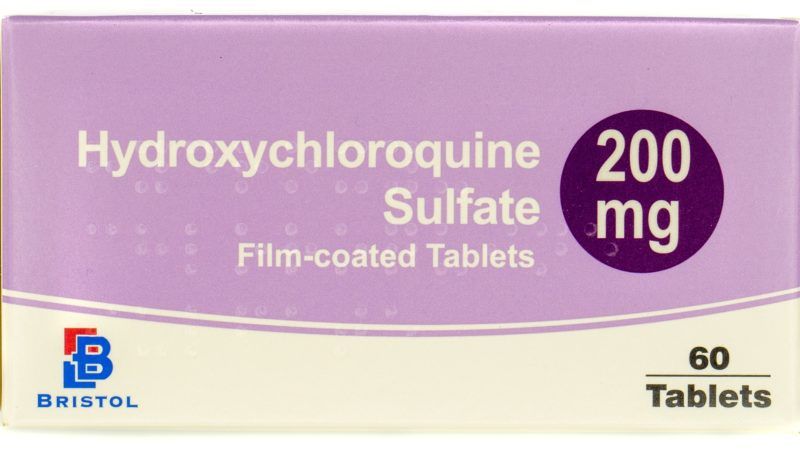More Evidence That Hydroxychloroquine Is Not a COVID-19 Silver Bullet
Trump: "We'll take a look at that. We're always willing to take a look."

Some small preliminary studies published a month ago suggested that the anti-malarial drugs chloroquine and hydroxychloroquine, in combination with the antibiotic azithromycin, might be a potent treatment for COVID-19. Subsequently, at a March 19 press conference, President Trump touted chloroquine, an analog of hydroxychloroquine, as a treatment for COVID-19. "It's shown very encouraging, very, very encouraging early results, and we're going to be able to make that drug available almost immediately, and that's where the FDA has been so great," said the president.
Obviously, it would be tremendously good news if chloroquine and hydroxychloroquine turn out to be really effective in treating COVID-19. Unfortunately, more recent research is not validating that hope.
A new nationwide retrospective study of patients treated at Veterans Administration medical centers is providing the largest dataset yet reported on the outcomes of COVID-19 patients treated with hydroxychloroquine, with or without azithromycin, anywhere in the world. The results are unfortunately not promising.
"Hydroxychloroquine use with or without co-administration of azithromycin did not improve mortality or reduce the need for mechanical ventilation in hospitalized patients," reported the researchers, who are affiliated with the Universities of Virginia and South Carolina. "On the contrary," they added, "hydroxychloroquine use alone was associated with an increased risk of mortality compared to standard care alone."
The fact that this is an observational study rather than a randomized controlled trial is an important caveat with respect to evaluating its conclusions. The study assessed 368 male patients treated for COVID-19 at Veterans Health Administration medical centers. In the study, 97 patients were treated with hydroxychloroquine (HC), another 113 received hydroxychloroquine in combination with the antibiotic azithromycin (HC+AZ), and 158 were not treated with hydroxychloroquine (no HC), receiving standard supportive management.
The researchers reported that "there were 27 deaths (27.8%) in the HC group, 25 deaths (22.1%) in the HC+AZ group, and 18 deaths (11.4%) in the no HC group. Mechanical ventilation occurred in 13.3% of the HC group, 6.9% of the HC+AZ group, and 14.1% of the no HC group." In other words, the patients not treated with hydroxychloroquine (No HC) had the lowest rate of death compared to the HC and HC+AZ cohorts. It is worth noting that the HC + AZ group were less likely to require mechanical ventilation.
President Trump, when asked about the disappointing results of the Veterans Administration study, replied, "I don't know of the report. Obviously, there have been some very good reports, and perhaps this one is not a good report. But we'll be looking at it."
In the meantime, new treatment guidelines issued by an expert panel convened by the National Institute of Allergy and Infectious Diseases recommended against the use of the combination of hydroxychloroquine plus azithromycin because of the potential for toxicities. The panel also observed that there "are insufficient clinical data to recommend either for or against using chloroquine or hydroxychloroquine for the treatment of COVID-19." If physicians choose to use either of the two antimalarials, the panel recommends that they should carefully monitor patients for dangerous heart rhythms problems known to be associated with the two drugs.
The researchers who analyzed the efficacy of hydroxychloroquine in treating Veterans Administration patients conclude, "These findings highlight the importance of awaiting the results of ongoing prospective, randomized, controlled studies before widespread adoption of these drugs."
While further research may eventually show that these drugs could offer some therapeutic benefits, they are right now not looking like the anti-COVID-19 silver bullets many people had hoped they would be.


Show Comments (189)